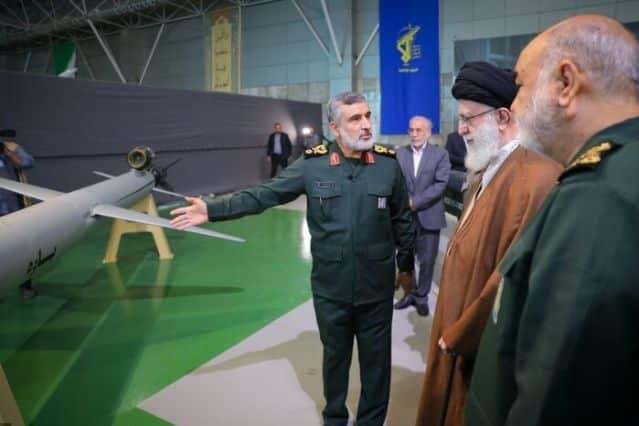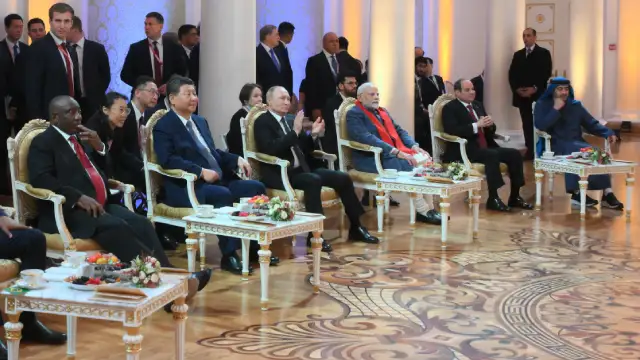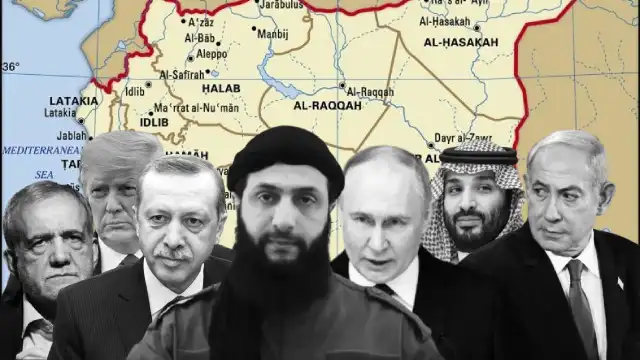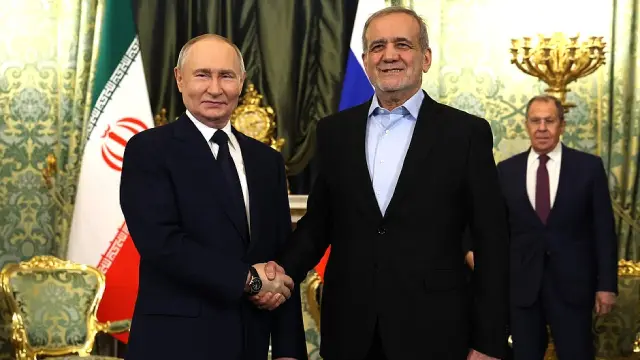The West claims Iran’s attack on Israel has been a futile exercise. But is that so? Why did Iran attack Israel?
After Iran attacked Israel with a barrage of missiles and drones on the nights of April 13th-14th, Tel Aviv has been downplaying its losses by claiming that its “Iron Dome” air defence system has managed to destroy 99% of Iranian missiles and drones. Israel’s claims are backed by the US-led collective West as well. This raises the question—why did Iran attack Israel? What did Iran gain from its direct attacks on Israel if its missiles and drones were destroyed mid-air?
It’s true that when Iran attacked Israel, a large number of its 300+ missiles and drones were destroyed in the air by the “Iron Dome” and the US and British airforces. However, that doesn’t mean that Iran’s attack on Israel was a futile one.
Iran achieved success from its attack on Israel at multiple levels.
The military gains
Iran has constantly claimed that it’s not launching a full-scale war on Israel and only retaliating against the Zionist attack on the consular section of its embassy in Damascus on April 1st. Seven, including top military personnel of Iran, were killed in the Israeli attack, which was a clear aggression of the Zionist regime not only on Syria’s sovereignty but also on Iran, as an embassy of a country in a foreign land is considered its sovereign territory.
While the US-led collective West and Israel look into losses in terms of civilian casualties and destruction of infrastructure—a method they adopt whenever they attack anyone—Iran’s Islamic Revolution Guards Corps (IRGC), the elite forces of the republic, limited the operation’s scope to only those military installations in the Israel-occupied Palestinian territories that were used for launching the April 1st attack.
The IRGC claimed that its ballistic missiles targeted the “Zionist regime’s Navatim Airbase, located in the south of the occupied territories”. Israeli media claimed that the airbase, located in the Negev Desert, was hit by several rockets.
Palestinian Shahab news agency claimed that several Iranian missiles hit the Ramon Airport in Negev.
The Iranians claimed that it’s the airbase where the F-35 planes were kept and those were used in the April 1st attack.
“The operation targeted the intelligence centre and the eye of the Zionist regime that had been used to direct all operations over the past six months, including the recent operation on the embassy of the Islamic Republic of Iran in Damascus,” Iranian Foreign Minister Hossein Amirabdollhian told a press conference on Sunday.
There are separate media reports on some rockets hitting Arad, an area east of Be’er Sheva city.
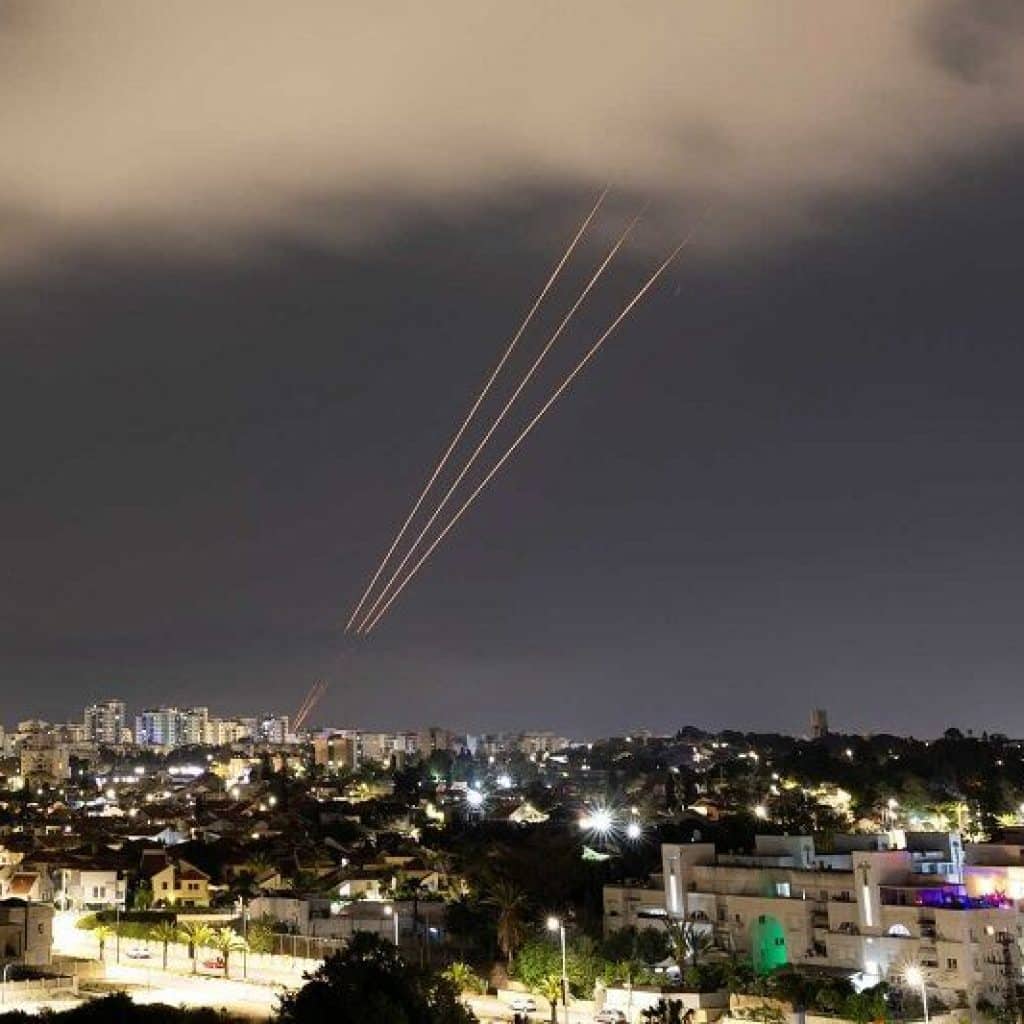
Highlighting the fact that Iran limited its scope of attacks and only targeted specific military installations, Amirabdollhian said, “Our armed forces did not target any economic or population centres, even in the attack on the military base… the necessary precision was taken into account for dealing with and responding to the Zionist regime.”
Unconfirmed reports say that over 44 operatives of the Mossad, the Israeli secret service agency, were killed in the strikes targeting the Negev airbase. More than 18 were injured. Israel has denied any casualties so far.
Iran’s attack on Israel also exposed the inherent weaknesses of the US-sponsored Israeli air-defence system.
According to Scott Ritter, a former US military veteran and ballistic missile intelligence analyst, the deployment of an advanced AN/TPY-2 X band radar on Har Qeren in the Negev Desert near Be’er Sheva significantly bolstered Israel’s ballistic missile defences. He said that operated by the US Army’s 13th Missile Defense Battery, this radar detects, tracks, and distinguishes between ballistic missiles and non-threats like space debris.
Ritter claims that this radar functions in two modes: the “forward-based mode” tracks missile launches, while the “terminal mode” guides interceptors to their targets, particularly optimising the Terminal High Altitude Area Defense (THAAD) system.
He also highlighted that during the Iranian missile attack, at least one, or possibly two, THAAD missile batteries were deployed in Israel. Integrated with Israeli radar and intelligence from the Ballistic Missile Defense Organization’s network, this formed a robust early warning and surveillance system against Iranian ballistic missiles.
Furthermore, the presence of US Navy ballistic missile defence-capable Aegis-class destroyers added to the defence architecture. These ships, equipped with the SPY-1 S-band radar and SM-3/SM-6 interceptor missiles, augment the ground-based radar systems, providing comprehensive protection to Israel.
Despite these measures, Ritter claims that the Iranian strike on Israeli air bases exposed the system’s failure. This failure highlights the shortcomings of US ballistic missile defence capabilities worldwide, challenging the efficacy of existing defence strategies against hostile ballistic missile threats.
This means, Iran now knows how to defeat the US ballistic missile defence systems, and through Iran, its allies like China, North Korea and Russia also know about these loopholes. Ritter underscored the threat this failure now poses to the US in the Euroasian, South Asian and Asia-Pacific war theatres.
Moreover, the US allies, who depend on its missile defence systems to fortify themselves against China and Russia, or countries like Japan and South Korea, who consider North Korea as a threat, will now feel more vulnerable than ever. Even changing the systems overnight isn’t an option as it would impose a huge burden on the already strained economies of the European and Asian countries.
Fadi Quran is a campaigns director at Avaaz, a global campaigning organisation. In an analytical tweet, the Quran wrote how Iran benefited from the attack on Israel.
“My analysis is that the scale of Iran’s attack, the diversity of locations it targeted, and weapons it used, forced Israel to uncover the majority of anti-missile technologies the US and it have across the region,” Quran wrote.
As Iran had been warning of an imminent retaliation before April 14th, it helped the Israelis, and the US forces prepare their defence systems to repel any attack. However, in doing so, they revealed their well-kept secrets to an adversary.
Moreover, Iran didn’t use any surprise element in the attacks but only used weapons that the West knew about. However, this banality in its approach has apparently been beneficial for Iran.
“The Iranians did not use any weapons Israel didn’t know it had, it just used a lot of them. But the Iranians likely now have almost a full map of what Israel’s missile defence system looks like, as well as where in Jordan and the Gulf the US has installations. It also knows how long it takes to prepare them, how Israeli society responds…etc,” Quran further wrote.
According to Quran, “Crucially, Iran can now reverse engineer all the intel gathered from this attack to make a much more deadly one credible. While the US and Israel will have to re-design away from their current model which has been compromised. Its success in stopping this choreographed attack is thus still very costly.”
The valuable intel that the Iranians gathered from this attack gave them a bird’s eye view of Israel’s strengths and weaknesses. In case of a future conflict, Iran can prepare itself accordingly. Moreover, for Israel and the US, to change their positions and weapon systems would be an expensive affair that none would want at present.
Moreover, through this attack, Iran also checked its capabilities, without revealing any special weapons in its inventory. It became the sole sovereign state in the modern world that has hit Israel inside its territories. This puts Iran as a major challenger to Israel’s bid for regional hegemony.
The Islamic Republic News Agency published the infographic below to show the IRGC’s maiden achievements from the April 13th Iranian attack on Israel.
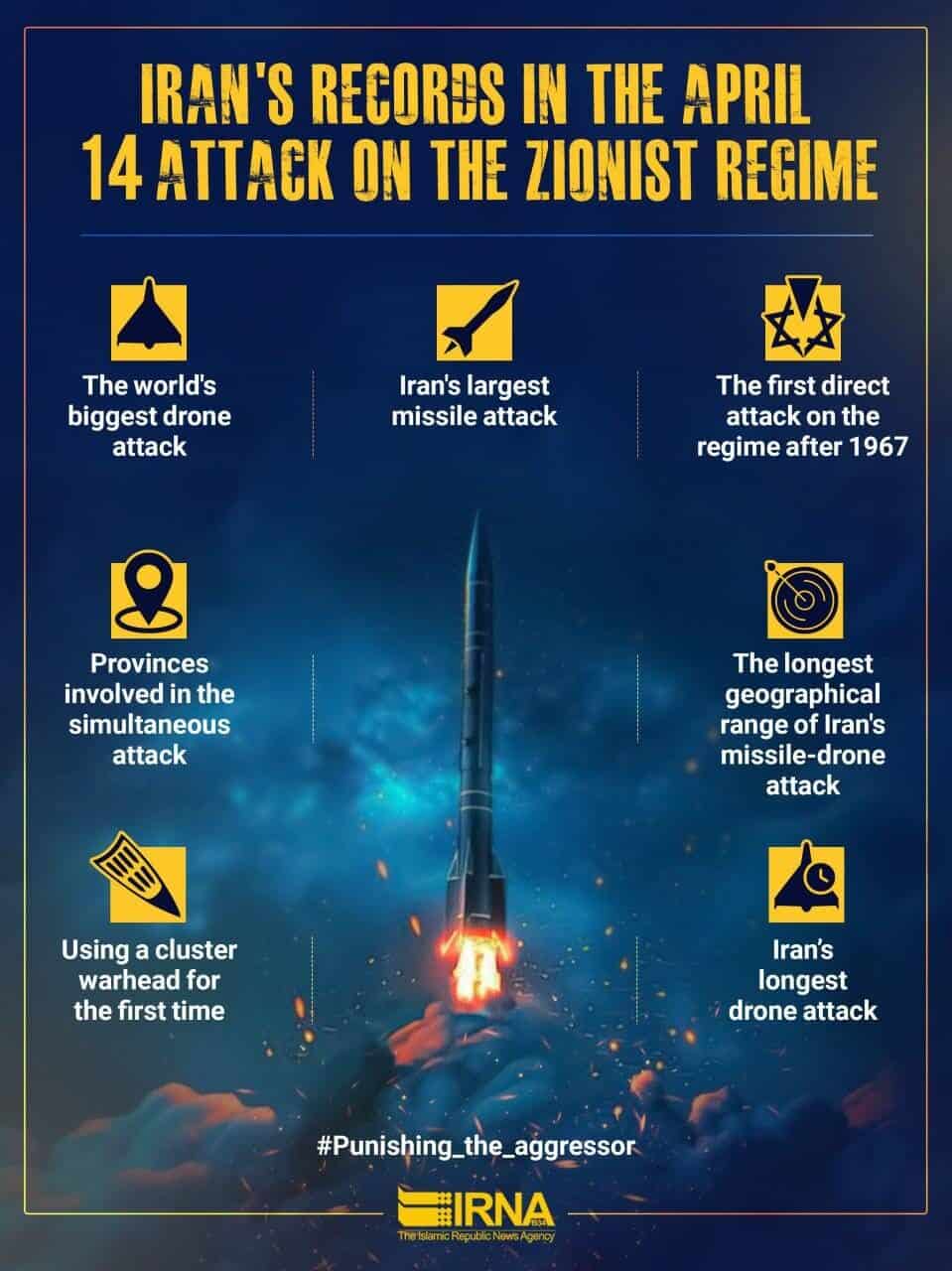
Geopolitical gains
For Iran, the April 13th attack was a major geopolitical victory.
Iran’s attack on Israel, the first of its kind after 1967, elevated Tehran’s status among the Muslims of the Arab world, where governments have historically exhibited servility towards the West and have been accommodating the Zionist forces.
Apart from the Muslim world, Iran also won the overwhelming support of the people of the countries of the global south, who view its limited action against Israel as a major contribution towards the cause of ending the ongoing genocide in Gaza.
Iran’s regional influence is exhibited in the fact that even India, which has been a strong ally of Israel under Prime Minister Narendra Modi, didn’t condemn the attack but took a neutral stand that matches that of the majority of global south countries and China and Russia.
Moreover, when the US-led collective West started manifesting support for Israel by portraying it as a victim, the politicians of the US, the UK and other western countries, including Canada, France and Germany, were rebuked by their people.
To justify Iran’s attack on Israel, Tehran has highlighted its right to self-defence under Article 51 of the United Nations Charter. Iran attacked Israel not over any dispute but officially to avenge the April 1st attack on its embassy, which is justified according to the UN Charter.
As the US-led collective West remained a mute spectator of Israel’s gross violation of human rights in Gaza, where its six-month-long genocide has killed over 33,000 innocent civilians, razed hospitals, churches and schools, as they didn’t oppose Israel’s attacks on Lebanon and Syria, and didn’t condemn the April 1st attack, they lost the moral authority to condemn Iran’s attack on Israel.
The US-led collective West’s patronisation of Israel returned to bite it. None of the major world powers like China, India and Russia support it. Moreover, Iran also managed to divide the Arab monarchies by weaning over traditional US allies like Kuwait and Qatar to its side. These two countries, which host the US’s military bases, denied the Pentagon the right to access their airspace to target Iranian drones and missiles.
Even though King Abdullah II allowed the US and the Israelis access to Jordan’s airspace to hit the Iranian missiles and drones, he became increasingly isolated in the region. Even Iran’s long-term foe Saudi Arabia, which has been normalising its ties with Tehran under a Chinese initiative since 2023, played a neutral part, although there are allegations that Riyadh allowed the US to carry out surveillance on Iran from its territory.
As an aftermath of the attack, though the Israeli government under Prime Minister Benjamin Netanyahu has announced that it will avenge Iran’s attack, reports say that the US has told Tel Aviv that it may not support it in case it wants to attack Iran.
In the meantime, due to Iran’s attack on Israel, the latter has been forced to call off the dreaded strikes planned on Rafah, the southern tip of the Gaza Strip bordering Egypt where millions of people from the northern part have fled to save their lives in the last six months. For the first time in the last six months, the Israeli bombings on Gaza stopped after Iran attacked Israel. This is a major achievement for not just Iran but the international community, which has so far failed to force Israel to accept a ceasefire.
Why did Iran attack Israel?
Iran attacked Israel to shock its foe, get accurate intel regarding its defence mechanism and capabilities, breach the strong fortification and exert its influence on a global scale. Iran also proved to the West that its sanctions on it have failed to deter its military capabilities.
Moreover, Iran’s attack on Israel has revealed to the world that the Israeli government has to rely more on the West for its defence in the face of any strong action by its regional adversaries, raising serious financial implications for the western taxpayers in a crucial election year.
In the days to come, if Israel takes any adventurist steps to launch a counter-offensive against Iran then it will stir a major regional conflict in which the Arab monarchies, including Saudi Arabia, will be compelled to take an anti-Israel position, which will affect the American interests in the region.
In a nutshell, Iran’s attack on Israel helped it gain in multiple ways and, therefore, it wasn’t merely an eyewash or a futile exercise. Its action showed that if Israel drags the region to a large conflict, then it will be at the receiving end and not Iran.
Tanmoy Ibrahim is a journalist who writes extensively on geopolitics and political economy. During his two-decade-long career, he has written extensively on the economic aspects behind the rise of the ultra-right forces and communalism in India. A life-long student of the dynamic praxis of geopolitics, he emphasises the need for a multipolar world with multilateral ties for a peaceful future for all.

